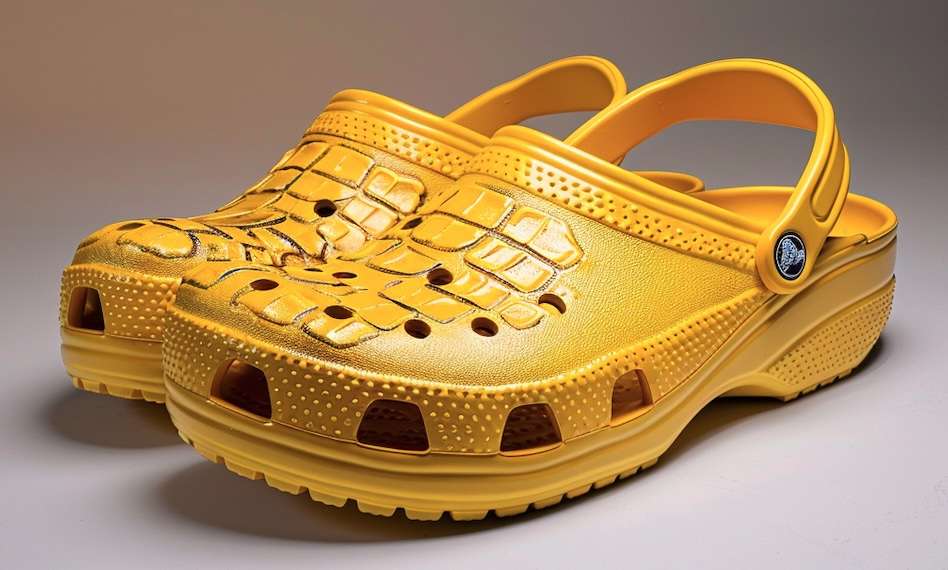THE BEST VIEW: “Make My Day”

 by Norma Best Boucher
by Norma Best Boucher
“Hey, great shoes!” I hear a man yell across the convenience store parking lot.
“Thanks!” I answer loudly as I look around for the person with the compliment.
There he is, a thin, old man with a scraggly white beard sitting in an old beat-up red truck.
“I like them shoes!” he adds in a deep Southern drawl as he drives away.
He made my day.
I like these shoes, too. In fact, they are my “this is going to be a great day” bright yellow Crocs shoes. On a sunny day they complete a matching outfit with the brightness of the sun; on a personally questionable day they put an extra bit of sunshine in my attitude; and on a cloudy day such as today they are a slice of sunshine breaking up the gray of the day.
Besides, these yellow shoes also show a certain pizzazz against the water in the puddles I am forced to wade. And…plastic shoes are waterproof to boot, pun intended.
This incident causes me to think about compliments in general and how they make us feel. I remember hearing my mother say, “If you can’t say anything good, don’t say anything at all.” Through trials and many errors, I now accept her warning.
A compliment that I will always remember was when my kindergarten teacher told me I had shiny blonde hair. My father was a tow head blond, and my mother was a beautiful brunette. My hair color was in-between and what people called dirty blonde.
At five years old I thought dirty blonde sounded not very pretty, so when my teacher asked me to ask my mother what shampoo she used to make my hair so shiny, I found out and proudly announced that she used an egg shampoo.
Many years later after I had taught for several years, I saw that kindergarten teacher in a jewelry store. I introduced myself.
Apparently, we had been one of her first classes. She remembered my name and, as unbelievable as it sounds, asked, “Didn’t you have blonde hair?”
I felt the glow of her original compliment once again.
When I was young, my family rented a camp on China Lake. There was a young woman who lived in another camp nearby. She was Native American and had beautiful long black hair and pretty eyes.
I never knew her name. I called her “The Pretty Lady.”
We rented that camp for several summers. The Pretty Lady got married and stayed at the camp with her husband and her mother. I quietly accompanied my mother whenever she visited the family. My mother had told her what I called her, so I remained shy about talking to her
Many years later when I was much older, I saw this woman in a grocery store. She had short black hair, but her face was unmistakable. She had seemed so much older than I when I was young, but I realized that she had been a very young woman, newlywed, when I knew her.
I walked down the aisle to speak with her. “You don’t know me and probably won’t remember me, but when I was young, my family rented a camp near you. I used to call you The Pretty Lady.”
She gave me a questioning look and asked, “You recognized me?”
“Oh, yes,” I told her. I should have added but didn’t, “You are just as pretty as ever.”
She looked straight at me, and with the same soft smile and pretty eyes, she answered, “I remember.”
After I retired from teaching, I worked several years at a bookstore. Because I had taught high school English students, the managers decided that I would make a good facilitator for their new young children’s programs.
Not having taught little children before, I called upon a professional preschool teacher I knew for advice. She told me to read them a story, give them snacks, and let them glue and glitter something, and I would be a success.
My first group of preschoolers came through. There were nine four-year-olds and one three-year-old. I was told the three-year-old was very precocious and fit right in with the older children.
After I read them the story, we had a very animated question and answer discussion. The three-year-old sat very quietly listening and watching the other children’s actions. Ending the talk, I asked if there were any more questions.
The three-year-old raised her hand.
“Yes. What is your question?” I asked.
This beautiful little girl with short legs dangling from a too big chair responded, “My name is Sylvie.”
She held up three fingers. “I’m three years old.”
She pointed to her foot. “I have new shoes, and I came to school to have fun.”
I waited a few seconds taking in her innocence and candor. Then I did what every lawyer says never to do. I asked a question for which I did not know the answer.
“Wonderful, Sylvie, and are you having fun today?” I asked.
Sylvie scrunched up her face in deep thought. Then she relaxed, smiled, and answered, “Yes!”
She made my day.
Responsible journalism is hard work!
It is also expensive!
If you enjoy reading The Town Line and the good news we bring you each week, would you consider a donation to help us continue the work we’re doing?
The Town Line is a 501(c)(3) nonprofit private foundation, and all donations are tax deductible under the Internal Revenue Service code.
To help, please visit our online donation page or mail a check payable to The Town Line, PO Box 89, South China, ME 04358. Your contribution is appreciated!


Leave a Reply
Want to join the discussion?Feel free to contribute!